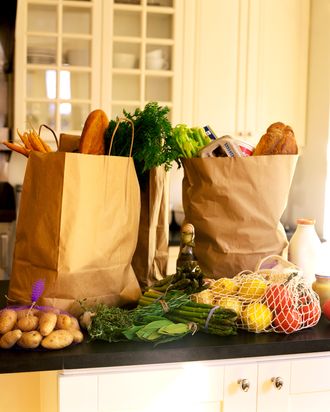
The coronavirus has confined many of us to our homes, save for the absolute necessities: Trips to the pharmacy, walking the dog, and grocery runs are about the only times people should be going outside. But supermarkets, vital though they are, come with their own quandaries: Every item in the store has been handled by numerous other people, perused and potentially sneezed on by countless others. Given what we know about the coronavirus’s staying power on surfaces (the research is still evolving, but so far it looks like the virus can live for 24 hours on cardboard and about 72 hours on plastic and steel), simply buying the food we need can feel risky. The best advice is still the simplest: Wash your hands – thoroughly and often, and always for 20 seconds – and practice social distancing. But it’s understandable why some people, like this Michigan doctor, are taking additional precautions.
In a 13-minute YouTube tutorial, Dr. Jeffrey VanWingen, a family physician in Grand Rapids, explains how to adapt a surgical “sterile technique” for your kitchen. Granted, some of his tips — like leaving groceries outside the house, as in on a porch or in a garage, for three days — will not be feasible for everyone. Nonetheless, VanWingen’s analogy for approaching contamination mitigation should be digestible for all.
“Imagine that the groceries that you have are covered with some glitter, and your goal at the end of this is to not have any glitter in your house, on your hands, or especially, on your face,” he says. “Imagine that disinfectants and soap, they have the power to dissolve that glitter.” Can do.
While you — a healthy person who has not been exposed to the coronavirus and who exhibits zero distressing respiratory symptoms; if you do not meet these criteria, VanWingen says stay home — are in the store, wipe down your cart before you put anything in it. Then, he recommends, only pick up items you are definitely going to buy. Also, it helps to make a list of everything you’ll need for two weeks’ worth of meals and snacks, so that you’re not dawdling in a possible germ zone.
Before you bring your groceries inside, prepare an unpacking station: first, VanWingen says, sanitize a large surface, designating one half for the grocery bags and the other half for cleaning their contents. As you start unbagging your items, get rid of any extraneous packaging — dump bread into a Tupperware and dispose of the bag; take a frozen pizza out of its box and store the plastic-wrapped product in your freezer — and use a sanitizer-saturated paper towel to wipe down anything that someone else has touched.
Fruit, VanWingen says, should be soaked in soapy water and then washed exactly the same way you’d wash your hands: For at least 20 seconds, with friction, per piece of fruit. Rinse it thoroughly, and store it somewhere clean.
It’s easy to start spiraling when thinking about the coronavirus; suddenly the whole world seems covered in dangerous germs. There’s still a lot we’re learning about the virus, but scientists do know that you’re much more likely to be infected by another person than by your groceries — currently, the CDC says person-to-person transmission is the main way the virus is spread. Wash your hands, disinfect frequently used surfaces (like your phone!), keep up the social distancing, and maybe also remember this helpful quote when you feel yourself freaking out: “Everything at the grocery store and restaurant containers and bags could in theory have infectious virus on them,” Dr. Linsey Marr, an expert in the transmission of viruses by aerosol at Virginia Tech, told the New York Times. “We could go crazy discussing these ‘what-ifs’ because everyone is a potential source, so we have to focus on the biggest risks.”





